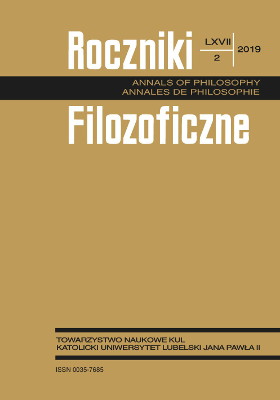The Problem of Responsibility for Accidental Effects of the Action
Abstract
In the paper, I defend the claim that agent who caused unintentional loss should take responsibility for it. Such kind of responsibility is neither a result of being guilty, being moral responsible for the loss, nor is just the expression of one’s sensitivity to other people’s hurt, but it has proper objective reasons. Human being experiences unity of his agency both in intentional actions and in actions which result in unintended harm. Moral agent is not only autonomous author of the action but also, through his corporeality, is somebody vulnerable to influence of accidental, unintended factors. In order to preserve personal integrity agent is obliged to admit the relation between his action and caused harm. Reasons to take responsibility for unintended results of action do not only relate to structure of human agency, but also relate to the structure of action itself and its relation to acting person. These issues are presented in two first paragraphs of the article. Characteristic features of obligation to take responsibility for unintended loss is presented in the last part of the article. Such responsibility is not a matter of voluntary agency, does not lie in the core of one’s agency but concerns what belong to “penumbra of agency.” Agent through act of his will makes himself responsible. Act of taking responsibility encompasses such behaviours like explanation, apology, help.
References
Enoch, David. 2012. „Being Responsible, Taking Responsability, and Penumbral Agency”. W: Luck, Value, and Commitment, red. Ulrike Heuer i Gerald Lang, 95–132. Oxford: Oxford University Press.
Filek, Jacek. 2003. Filozofia odpowiedzialności XX wieku. Kraków: Wydawnictwo ZNAK.
Greenspan, P[aricia] S. 1983. Practical Guilt. Moral Dilemmas, Emotion, and Social Norms. New York, Oxford: Oxford University Press.
Husserl, Edmund. 1982. Medytacje kartezjańskie. Przełożył Andrzej Wajs. Warszawa: Państwowe Wydawnictwo Naukowe.
Ingarden, Roman. 1973. „O odpowiedzialności i jej podstawach ontycznych”. W: Idem. Książeczka o człowieku, 77–184. Kraków: Wydawnictwo Literackie.
Jensen, Henning. 1991. „Morality and Luck”. W: Moral Luck, red. Daniel Statman, 131–140. Albany: State University of New York Press.
Judycki, Stanisław. 2004. Świadomość i pamięć. Uzasadnienie dualizmu antropologicznego. Lublin: Towarzystwo Naukowe KUL.
Juros, Henryk, i Tadeusz Styczeń. 1973. „Moralny akt ludzki”. W: Encyklopedia Katolicka. T. 1. Lublin: Towarzystwo Naukowe KUL.
Kant, Immanuel. 1957. Krytyka czystego rozumu. T. II. Przełożył Roman Ingarden. Kraków: Państwowe Wydawnictwo Naukowe.
Krąpiec, Mieczysław. 1983. „Decyzja — bytem moralnym”. Roczniki Filozoficzne 31, z. 2: 47–65.
MacIntyre, Alasdair. 1996. Dziedzictwo cnoty. Przełożył Adam Chmielewski. Warszawa: Państwowe Wydawnictwo Naukowe.
MacIntyre, Alasdair. 2009. „Struktury społeczne i ich zagrożenia dla moralnej sprawczości”, przeł. Adam Chmielewski, w: idem, Etyka i polityka, red. naukowa Adam Chmielewski. Warszawa: Wydawnictwo Naukowe PWN.
Nagel, Thomas. 1997. „Traf w życiu moralnym”. W: Idem. Pytania ostateczne. Przełożył Adam Romaniuk. Warszawa: Fundacja Aletheia.
Rescher, Nicholas. 1991. „Moral luck”. W: Moral Luck, red. Daniel Statman, 141–166. Albany: State University of New York Press.
Ricoeur, Paul. 2003. O sobie samym jako innym. Przełożył Bogdan Chełstowski. Warszawa: Wydawnictwo Naukowe PWN.
Spaemann, Robert. 1996. „Czyn a piękne życie. O pojęciu natury czynu”. Przełożył Jarosław Merecki. Ethos 9, nr 1–2 (33–34): 31–41.
Stępień, Antoni B. 2001. „W poszukiwaniu istoty człowieka (Z fenomenologii i metafizyki ludzkiego bytu)”. W: Idem. Studia i szkice filozoficzne. Część II. Lublin: Redakcja Wydawnictw KUL.
Tischner, Józef. 1971. Aksjologiczne podstawy doświadczenia „ja” jako całości cielesno- przestrzennej. (Logos i ethos, Rozprawy filozoficzne). Kraków: Polskie Towarzystwo Teologiczne.
Walker, Margaret U. 1991. „Moral Luck and the Virtues of Impure Agency”. W: Moral Luck, red. Daniel Statman, 235–250. Albany: State University of New York Press.
Williams, Bernard. 1991. „Postscript”. W: Moral Luck, red. Daniel Statman, 251–258. Albany: State University of New York Press, 1991.
Williams, Bernard. 1999a. „Działania dobrowolne i odpowiedzialne podmioty”. W: Ile wolności powinna mieć wola? I inne eseje z filozofii moralnej. Przełożyli Tadeusz Baszniak, Tomasz Duliński i Michał Szczubiałka, 197–214. Warszawa: Fundacja Aletheia.
Williams, Bernard. 1999b. „Traf moralny”. W: Ile wolności powinna mieć wola? I inne eseje z filozofii moralnej. Przełożyli Tadeusz Baszniak, Tomasz Duliński i Michał Szczubiałka, 215–238. Warszawa: Fundacja Aletheia.
Wojtyła, Karol. 1994. „Osoba i czyn”. W: Osoba i czyn oraz inne studia antropologiczne. Lublin: Towarzystwo Naukowe KUL.
Wolf, Susan. 2001. „The Moral of Moral Luck”. Philosophic Exchange. 31, issue 1: 4–19.
Woroniecki, Jacek. 1986. Katolicka etyka wychowawcza. T. I: Etyka ogólna. Lublin: Redakcja Wydawnictw KUL.
Copyright (c) 2019 Roczniki Filozoficzne

This work is licensed under a Creative Commons Attribution-NonCommercial-NoDerivatives 4.0 International License.





